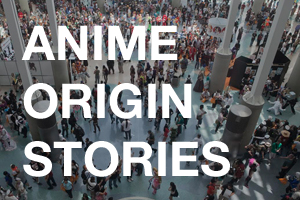Today I’m publishing a second guest post from my friend Katriel. Book writing has consumed my life lately, so when Kit pitched me an idea for a panel presenting tutorial post, I jumped at the opportunity. I’ve presented a panel twice in my life, and I loved Kit’s idea of helping more people get the confidence to present panels of their own.
Katriel Paige is a translator, editor, lecturer, and occasional journalist. They love Japanese yokai stories, convention cultures, good conversations, and fox plushes. They also contribute to Study of Anime.
What do people fear more than darkness, heights, spiders, or even death? As it turns out, public speaking remains the number one phobia people face.
It may be easy to avoid public speaking for the most part. But when it comes to fandom conventions, where one of our biggest fears clashes with one of our greatest passions, it can be trickier. Many people who have something important to say about fandom simply avoid doing so.
I present on Japanese folklore and sacred culture topics at Japanese animation conventions. These topics can get a bit technical, for example detailing the range of what kami might mean in English.
Since 2004, I have presented at conventions to huge, packed rooms, and spoken to audiences ranging from 20 strangers to 500. I’ve even given panels where special guests—people I admire most—are watching and listening.
But I’d like to tell you a secret: I still get nervous about public speaking—every single time.
I know you have powerful things to say about the fandom topics you’re interested in. And I don’t want you to let your concerns over public speaking deter you any longer. When I’m preparing or presenting, here are the ways I keep my nerves in check.
Have conversations
You like talking about the Marvel Cinematic Universe? You love talking about the different versions of Sailor Moon? Now find people who are interested in discussing those topics with you.
Surround yourself with people that will challenge you to think more, or consider different angles. Perhaps you have not considered localization choices, or publication trends, or world events. All of these things can have an impact on media. Learn and talk, talk and learn.
Before, you plan out your speech, a back-and-forth with other fans can help you finesse your points and find confidence in what you want to present.
Focus
When you’re up in front of a crowd, even five minutes can seem like a long time. When I tell people about how long my own presentations are, they say, “But fifty minutes is such a long time!”
However, when I’m focusing on a particular topic, I hardly notice the minutes passing by. I have a clear and defined point that keeps me centered and keeps the speech flowing.
While you may feel the impulse to add “filler” to your presentation to extend the length, you should really be doing the opposite and narrowing your focus. When your mind has fewer places to wander, your speech will be sharper.
Listen
Listen to yourself. Speak to yourself in the mirror. Find some friends—within and without the fandom you are talking about—and go through your presentation with them. Make a video. Record your voice. Whatever works.
Listen to others. Some audiences are quiet. Some have high energy and love participation. The audience reflects a mood, and a quiet audience doesn’t necessarily belie a poor presentation. Get used to speaking to many different kinds of groups.
Try it out
Take advantage of the resources your local convention may have to improve your panels.
Some conventions, such as NekoCon have panel auditions to aid them in finding new panel programming for future years. An audition is a great way to test and get feedback for a panel.
If you want to give presentations again, be open to feedback. Maybe a term you used was insensitive. Or maybe talking over a video clip was distracting. Give your audience a way to contact you in case they have any questions. If people have criticism, resist the impulse to revamp the whole panel. But if you get a lot of the same critique, that might be a sign that something could be improved.
Even though public speaking can be scary, it led to me discovering new people—and new ideas. Most of the people I know from fandom now, like Charles and Lauren, I met because I spoke up with passion. So perhaps you’ll find new ideas, mentors, or friends—or a new way to look at your fandom!
Best of luck, and best in speaking.
Extremely old photo of me and Patrick Taylor presenting Sexism in Anime Fandom at Anime USA 2012. Otaku Journalist occasionally publishes guest posts about fandom and subculture. You can pitch me your idea here.
Discover more from Otaku Journalist
Subscribe to get the latest posts sent to your email.





4 Comments.
I need to write one of these as well…I have the notes already written down, so why haven’t I?
[…] at Otaku Journalist, guest poster Katriel Paige discusses presenting panels at conventions. Otaku Journalist Lauren also contributes a guest post at Manga Therapy on “Mushi-shi – […]
These are good main points. They are the source of refining a panel.
[…] Speaking up: How and Why to Present Panels at Conventions at Otaku Journalist […]